|
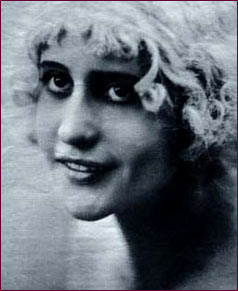 Vera
Holodnaya Vera
Holodnaya
Vera Holodnaya (1893-1919) was the first Russian movie
star of the silent black and white film.
She is called a "Queen of the screen", though
she spent only 4 years out of her 26 starring in the movies.
Some say she starred in 50, some say in 80 movies.
Unfortunately, only 5 survived.
She was one of a kind - smart, beautiful, talanted,
pure, happy and loved by everyone.
Her movies, especially the most famous one called "By
the fireplace" were popular not only in Russia, but abroad,
as there was no language barrier in the silent movies. She
got invitations to work in Hollywood and Berlin, but she refused
all of them and stayed in Russia.
She was born on August 1893 in Odessa (some say in
Poltava), Ukraine. When she was two her family moved to Moscow.
At 17 she married law student Vladimir Holodny, who adored
her.
|
|
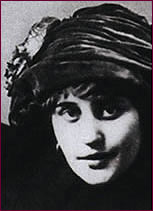 In
the fall of 1915, she met legendary Russian singer Alexander
Vertinsky. He came with the letter from her husband, who
was at the war at that time, and instantly fell in love with
her. From that moment on, he would visit her every day and
just sit and stare at her for hours. He started to bring her
his poems - naive and simple at first, then nice, then very
good ones. A lot of his sondgs and poems were dedicated to
adorable Vera. His poem "Your
fingers" In
the fall of 1915, she met legendary Russian singer Alexander
Vertinsky. He came with the letter from her husband, who
was at the war at that time, and instantly fell in love with
her. From that moment on, he would visit her every day and
just sit and stare at her for hours. He started to bring her
his poems - naive and simple at first, then nice, then very
good ones. A lot of his sondgs and poems were dedicated to
adorable Vera. His poem "Your
fingers"
was predicting her early death. Vera was very upset with Vertinsky
for writing that poem.
"Your fingers smell like ladan
and
Sadness sleeps in your eyes.
You don't need anything now.
And you don't feel sorry for anyone."
Strangely enough, she died at 26, surprising everyone around.
Her death was surrounded with a lot of mistery. Official
version is that she died of "Spanish" flue that killed
a lot of people at that time. But there were many other versions
of her death.
Some say she was killed by Bolsheviks when she tried
to immigrate to Europe. Some say she was poisoned by the French
Ambassador, who Vera had an affair with and who thought, that
she was spying on him for Bolsheviks. She died 2 days after
dancing tango with him at the French Ball. According to the
legend, when she returned to her room, there was a vase with
poisoned lilies from him.
|
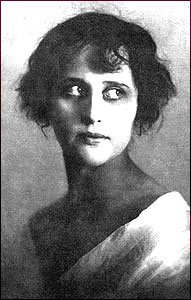 The
best doctors tried to save her life, but at the time of the
war there simly were not enough medications. For 2 days hundreds
of people stayed outside her house day and night, though nobody
was allowed to see her. The
best doctors tried to save her life, but at the time of the
war there simly were not enough medications. For 2 days hundreds
of people stayed outside her house day and night, though nobody
was allowed to see her.
After she died she was quickly burried at the local semetery
in Odessa. Her face was covered and nobody was allowed to stay
by her coffin for a long time. It seamed like someone was covering
the real reason of her death.
The funeral of Vera Holodnaya was taped and it still
exist, but not her grave. In 1931 the whole cemetery was converted
into park.
Monument to famous Odessa-born, silent film actress Vera Holodnaya
is planned to be open in Odessa on September 2, 2003, the City
Day.
|

|
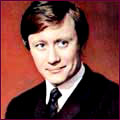 Andrey
Mironov Andrey
Mironov
Andrey Mironov (1941-1987) was literary born on the stage.
His mother, Maria Mironova was taken away to the hospital right
from the stage of the Moscow Theatre of Miniatures. Decades
later Andrey died on the stage. During the play "A Crazy
Day or Le Mariage de Figaro" he passed out and died in
the way to hospital.
|
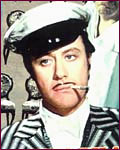 “Life
is a great virtue. And as it turns out it doesn’t really
last that long. There is enough of misfortune, grief, drama,
difficulties, and confusion in it. That is why we should appreciate
the precious moments of joy and happiness – they make us
kinder. When a person is smiling, laughing, delighting something
or compassionating he becomes better and more pure...”
- Andrey Mironov. “Life
is a great virtue. And as it turns out it doesn’t really
last that long. There is enough of misfortune, grief, drama,
difficulties, and confusion in it. That is why we should appreciate
the precious moments of joy and happiness – they make us
kinder. When a person is smiling, laughing, delighting something
or compassionating he becomes better and more pure...”
- Andrey Mironov.
|
|
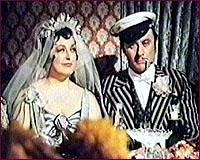 The
first small part in the film of Yuliy Raisman "What if
it’s Love?" Andrei Mironov received as a student.
The two next movies "My Younger Brother" (1962)
and "Three Plus Two" brought him fame. Starting
with 1966 his career – especially as a comedy actor –
is going up the hill. He was one of the most talented actors
of his time, admired by millions of viewers. The
first small part in the film of Yuliy Raisman "What if
it’s Love?" Andrei Mironov received as a student.
The two next movies "My Younger Brother" (1962)
and "Three Plus Two" brought him fame. Starting
with 1966 his career – especially as a comedy actor –
is going up the hill. He was one of the most talented actors
of his time, admired by millions of viewers.
|
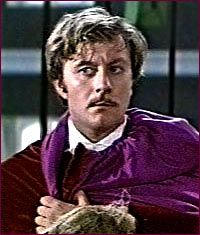 The
most famous works in the cinema: "The Diamond Hand",
"A Straw Bonnet", "Twelve Chairs", "A
Simple Miracle", "The Tale Of Travellings", "A
Man From The Capuchin Boulevard". The
most famous works in the cinema: "The Diamond Hand",
"A Straw Bonnet", "Twelve Chairs", "A
Simple Miracle", "The Tale Of Travellings", "A
Man From The Capuchin Boulevard".
His role in the comedy "The Diamond Hand" brought
Andrey Mironov a huge success. Sometimes the crowd would carry
him from the Theater of Satira, where he worked, till his car.
Girls would wait for hours outside the Theater for a quick look
at him.
|
|
 In
the beginning of 1970s he married Katherina Gradova, who everyone
remembered as Kath from the movie “The Seventeen Moments
of Spring”. They had daughter Maria, named after Andrey's
famous mother. Now Maria Mironova is one of the well-known
Russian actresses. In
the beginning of 1970s he married Katherina Gradova, who everyone
remembered as Kath from the movie “The Seventeen Moments
of Spring”. They had daughter Maria, named after Andrey's
famous mother. Now Maria Mironova is one of the well-known
Russian actresses.
Andrei Mironov was famous enough in his lifetime, after
his death he became a legend.
When talking about Andrey his friends particularly stress
his fantastic devotion to his profession and viewers.
|

|
Irina Alferova
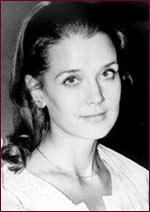 All
her life Irina Alferova (born in 1951) tries to prove that
she is not only an attractive woman, but also a talented actress. All
her life Irina Alferova (born in 1951) tries to prove that
she is not only an attractive woman, but also a talented actress.
For many years Irina Alferova performed only minor
parts in her adorable Lenkom Theater, although she was already
a well-known movie star.
She is best known for her role of Dasha in a movie
"Road to Cavalry", based on the novel of the same
name by Alexey Tolstoy about the life of two sisters Dasha
and Katia from the eve of World War I to end of the Russian
Civil War.
|
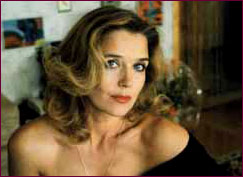 Irina
is charming, down to earth, feminine and very private. She was
married at one time to a famous actor Alexander Abdulov, whith
whom she starred in a popular movie "Never leave those
you love". Alexander was nominated "The most popular
actor in Russia" in 2002. Irina
is charming, down to earth, feminine and very private. She was
married at one time to a famous actor Alexander Abdulov, whith
whom she starred in a popular movie "Never leave those
you love". Alexander was nominated "The most popular
actor in Russia" in 2002.
Now her and Alexander's daughter Kseniya, is gaining
her popularity as an actress.

|
|
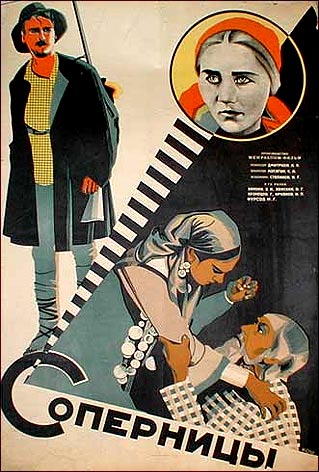
Moscow, 1929 Movie Poster "Rivals". |

|
|
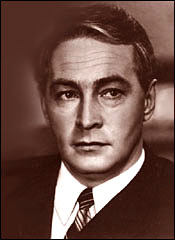 Vyacheslav
Tikhonov Vyacheslav
Tikhonov
The contemporary history is not necessarily events
which are described in school textbooks. Often, many things
we do not view at this angle get entwined with our lives.
But years go by, many things change while those minor things
remain.
|
That’s what happened with
“The Seventeen Moments of Spring”. The best-known
Russian series of all time has sparked a cult.
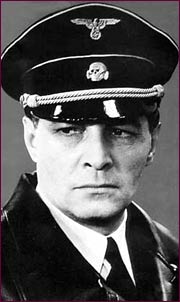 The brilliant acting of Vyacheslav Tikhonov in the role
of Stirlitz made him an eternal superstar of the Soviet screen.
Moreover, “perestroika”
went by, the Soviet hierarchy of values broke down, the USSR
ceased to exist, but the film is still being viewed and loved.
Even in post-Soviet society, after 25 years of screening, Stirlitz
is still popular. Newspapers report that when the movie "Seventeen
Moments of Spring" is on, there are noticably fewer people
on the streets and crime figures fall a few percentage points
in Moscow.
The brilliant acting of Vyacheslav Tikhonov in the role
of Stirlitz made him an eternal superstar of the Soviet screen.
Moreover, “perestroika”
went by, the Soviet hierarchy of values broke down, the USSR
ceased to exist, but the film is still being viewed and loved.
Even in post-Soviet society, after 25 years of screening, Stirlitz
is still popular. Newspapers report that when the movie "Seventeen
Moments of Spring" is on, there are noticably fewer people
on the streets and crime figures fall a few percentage points
in Moscow.
|
 The
movie is based on the novel of the same name written by most
successful of the Russian spy writers Julyan
Semyonov. “The Seventeen Moments of Spring” are
featuring a Russian spy, who was a high-ranking official in
the Nazi SD in the final weeks of WWII, going under the name
von Stirlitz. The
movie is based on the novel of the same name written by most
successful of the Russian spy writers Julyan
Semyonov. “The Seventeen Moments of Spring” are
featuring a Russian spy, who was a high-ranking official in
the Nazi SD in the final weeks of WWII, going under the name
von Stirlitz.
|
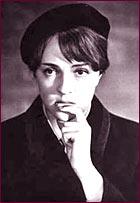 Otto
von Stirlitz is the code name for Maxim Isaev, a Soviet intelligence
agent who faithfully served the motherland in various posts
from 1918 to 1967. He operated in Paris, Shanghai, and, most
notably, in Nazi Germany during World War II where he infiltrated
the SD (political security police) and practically single-handed
exposed an attempt by Britain and the United States to conclude
a separate peace with the Nazis and open a joint front against
the Soviet Union. Otto
von Stirlitz is the code name for Maxim Isaev, a Soviet intelligence
agent who faithfully served the motherland in various posts
from 1918 to 1967. He operated in Paris, Shanghai, and, most
notably, in Nazi Germany during World War II where he infiltrated
the SD (political security police) and practically single-handed
exposed an attempt by Britain and the United States to conclude
a separate peace with the Nazis and open a joint front against
the Soviet Union.
Unlike the "James Bond" type of spy thrillers,
the Stirlitz novels are based on actual events, thoroughly
researched and full of historical documents and facts. Semyonov
flew all over the world to research his books, even meeting
with famed Nazi Otto Skorzeny, and maintained close contact
with KGB agents.
|
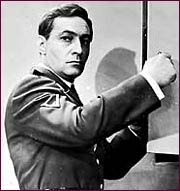 Stirlitz
was an ideal Soviet intelligence worker. Modest and businesslike;
cultured and well-rounded. He could speak on philosophy, history
and science with equal ease. He knew most every European language,
with the exception of Irish and Albanian. Hard-headed and cold-blooded,
but not cruel. He preferred to use intellectual methods rather
than crude violence. In his entire career he killed only once. Stirlitz
was an ideal Soviet intelligence worker. Modest and businesslike;
cultured and well-rounded. He could speak on philosophy, history
and science with equal ease. He knew most every European language,
with the exception of Irish and Albanian. Hard-headed and cold-blooded,
but not cruel. He preferred to use intellectual methods rather
than crude violence. In his entire career he killed only once.
Stirlitz's status as folk hero is confirmed by the prevelance
of Stirlitz jokes, which themselves constitute a whole sub-genre
of Russian literature just begging for academic study.
-------------------------------------------------------------------------------
Stirlitz Joke #1
A flower pot fell off the window of the secret apartment
and smashed Stirlitz on the head. This was the signal that his
wife had just given birth to a son. Stirlitz shed a single manly
tear. He hadn't been home for seventeen years.
Stirlitz Joke #2
Stirlitz went into Muller's
office and said, "Herr Muller, how would you like to work
as an agent for Soviet Intelligence? The pay is good."
Muller, shocked, gives an angry rebuff, then eyes Stirlitz suspiciously.
Stirlitz starts to leave, but then stops and asks, "Gruppenfuhrer,
do you have any aspirin?"
Stirlitz knew that people always remember only the end of a
conversation.
Stirlitz Joke #3
Muller says to Stirlitz:
"I think I know who you really are - you are Jewish!"
"No, I am Russian" - said Stirlits and then thought
"Have I said too much?"
------------------------------------------------------------------------------- |
 Click
here to listen to the soundtrack from movie “The Seventeen
Moments of Spring”. Click
here to listen to the soundtrack from movie “The Seventeen
Moments of Spring”.
Definately, the role of Schtirlitz is the one that broght
Vyacheslav Tikhonov huge success and recognition as an actor,
but there were others no less significant.
In 1968 he played a major role of Prince Andrei Bolkonsky
in the gigantic motion picture epic "War and Peace",
based on the novel of the same name by the great Russian writer
Leo Tolstoy.
A project was so huge that it had to be funded by the
Soviet Government. For the shooting of the film’s battle
scenes, a regular army was used, as well as a specially created
cavalry regiment. Over 120,000 soldiers participated as extras
in the crowd scenes. More than 35,000 costumes were made for
the production. |

|
Links
About Russian Word TV
Channel, NTV
channel, Andrey
Mironov official website, Andrey
Mironov Music Festival, Satire
Theater official Website, www.oleg-dal.ru,
www.papanov.ru,
interview
with Irina Alferova, (Russian only).
About the novel "Seventeen
moments of spring" at www.sovlit.com, article about
the movie "War
and Peace", about
Oleg Menshikov, about
Moscow International Film Festival, www.profifilm.com
(English)
|
|



